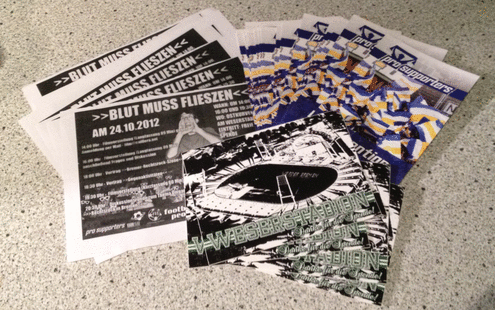About 300 mainly young Werder supporters attended the event in order to exchange ideas how to deal with this issue. First we showed the documentary “Blut muss fließen” in the long version. This documentary shows undercover takes of fascist concerts.
Furthermore the film deals with the difficulties of people willing to work together with public instances, as e. g. the Federal Department of the Interior, in order to hinder such kind of agitation. The long version offers an additional insight into the European context of extreme right-wing music. Subsequently there was a lecture about fascist activities in Bremen as Bremen can be considered as a stronghold of fascist music with about 40 bands in the urban hinterland. A sound studio in Schwarme is producing their recordings for 10 years.
The oldest fascist German Band “Endstufe” comes from the Bremen region and the currently most successful band “Kategorie C – Hungrige Wölfe” is from Bremen, too. The latter are especially related to the football context as parts of the band are an integral part of the fascist hooligan group “Standarte 88”. In this way fascist values are disseminated in a by far broader context as the local neo-Nazi scene. Therefore pretended apolitical supporters are still singing songs of this band and similar ones. Still there are too many young people who are attracted by their lyrics about comradeship, strength and clear enemies. A second lecture covered structures opposing fascist music. Where is it possible to gather information? How can I get organized?
At 7:30 the film was showed in a shorter version. In this after work presentation the European aspect was not covered. Yet the problems and success of fascist music was revealed anyway. Subsequently there was an open discussion about both the neo-Nazi scene in Bremen and the documentary itself. The latter still received very little public funding like the case of the NDR (public media in Northern Germany) reveals. This channel showed a short report about the film including a recommendation. Yet they are not showing any interest in either financing or producing the film itself. Because of further presentations the authors are hoping for pressures urging public media to show the film in a larger context. The aim of the filmmakers remains to reanimate public documentaries in television.

